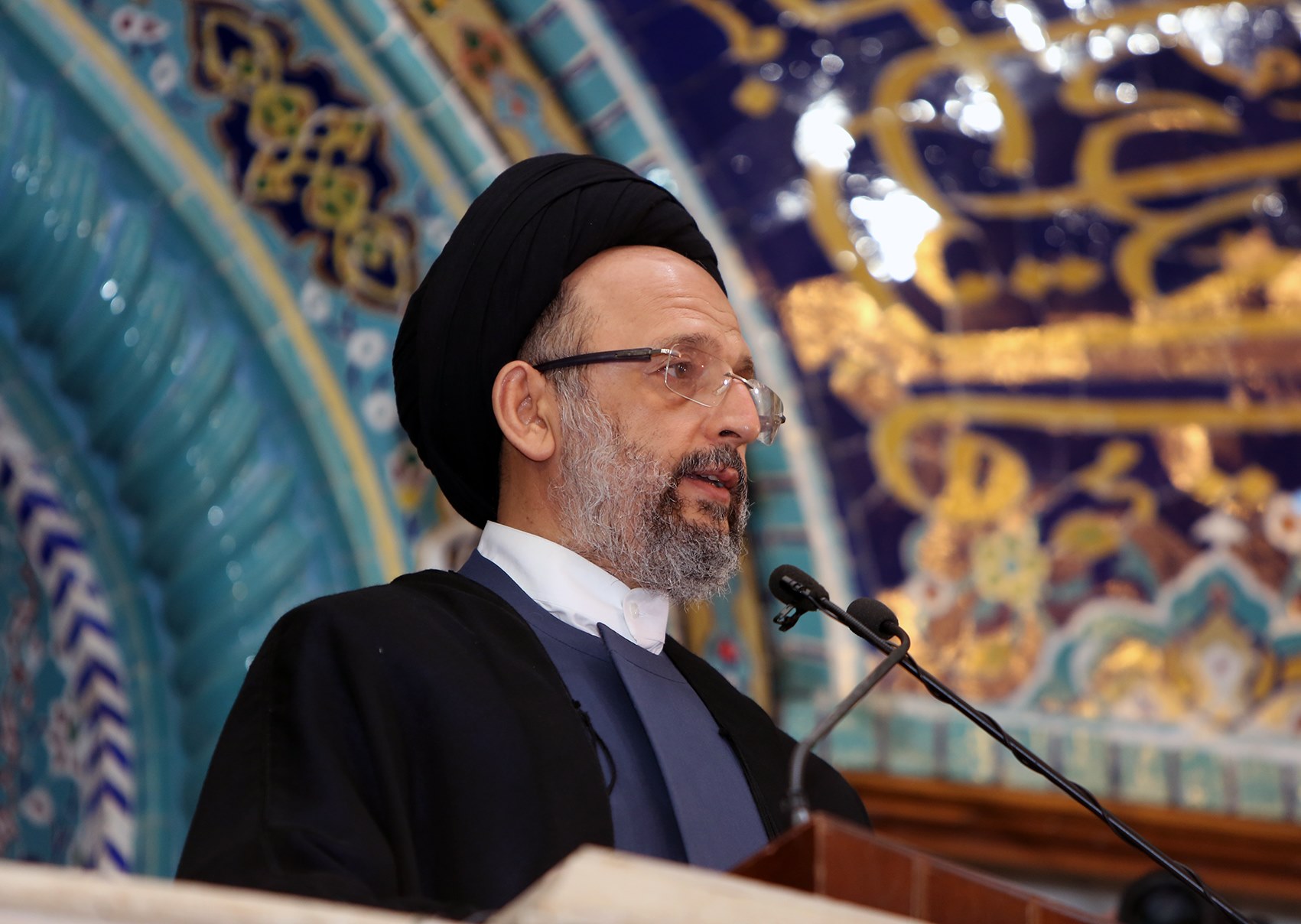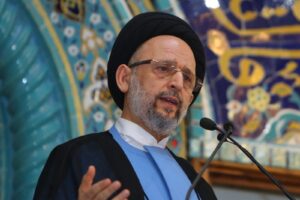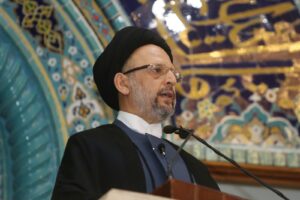Islamic Justice
His Eminence, Sayyed Ali Fadlullah, delivered the two Friday prayer sermons at the Imamain Al-Hassanain Mosque, Rabi Ath-Thani 12, 1442 H. /November 27, 2020. Several prominent religious scholars, dignitaries and believers attended the Jumu’a prayer. Following is the edited text of the sermons:
The first Sermon
Allah, The Most Exalted, says in His Glorious Book: ‘But whoever earns an offense or a sin and then blames it on an innocent [person] has taken upon himself a slander and manifest sin’. Allah, The Most Exalted, speaks the Truth.
This Ayat was revealed after the following incident: A shield was stolen from one of the companions of the Messenger(p.). A man of the Ansar tribe was suspected. The suspect knew that The Messenger(p.) was informed and he threw the shield in the home of a Jew. Upon his request, his tribe went to the Messenger(p.) and claimed that the man was innocent and that it was the Jew who stole the shield and that it was in his house. Upon finding the shield in the Jew’s house, the Prophet(p.) ruled that the Ansari was innocent and the Jew was the thief.
It was natural for the Prophet(p.) to judge in this way for his judgment was based on the evidence provided to him, since he did not rule as a result of a revelation or knowledge of the unseen, but rather according to the evidence provided to him. That is why he used to say:” You people (opponents) come to me with your cases; and it may be that one of you could present his case eloquently in a more convincing way than the other, and I give my verdict according to what I hear. So if ever I judge (by error) and give the right of a brother to his other (brother) then he (the latter) should not take it, for I am giving him only a piece of Fire.”
But Allah wanted the justice to be done. That is why the following Ayat was revealed to point out to the Messenger(p.) the truth of the matter: ‘But whoever earns an offense or a sin and then blames it on an innocent [person] has taken upon himself a slander and manifest sin’.
Thereafter, the Messenger(p.) called upon the believers in a hurry to tell them what Allah, The Most Exalted, has informed him that the Jew was innocent. The Muslims were surprised to learn that Allah, The Most Exalted, has revealed Quranic Ayats to acquit a Jew- for the Jews were known by their hostility to Muslims and that they benefited from any occasion to conspire against them- and convict a Muslim who was one of the Ansar who hosted the Prophet and supported him. However, they had to accept the ruling of God and to oppoligise from the Jew and punish the thief…
Rules to safeguard the society:
These Ayats were not revealed in the Quran to deal with an incident that happened at the time of the Messenger (p.); they wanted to lay out several rules that should govern the community of believers and act as its basis:
The first rule: Justice in Islam is not affected by the emotions of love or hatred, or by the difference in religion or political stances… It does not yield to the balance of power and money, since it is above all that. This is what Allah, The Most Exalted, called for when He said:‘O you who have believed, be persistently standing firm in justice, witnesses for Allah, even if it be against yourselves or parents and relatives. Whether one is rich or poor, Allah is more worthy of both. So follow not [personal] inclination, lest you not be just. And if you distort [your testimony] or refuse [to give it], then indeed Allah is ever, with what you do, Acquainted’.
To further underscore this point, we recall the following incident: when one of the companions of The Messenger(p) came to intercede for a woman from Bani Makhzoum, one of the most prominent tribes of Quraish, who stole, he became very angry and said:
What destroyed those who became before you was that if the noble amongst them stole, they would leave him, and if the weak stole they would inflict the penalty upon Him. By Allah, if Fatima daughter of Muhammad stole, I would cut off her hand..
The second rule: Do not defend the corrupt: Islam guides the believers not to defend anyone who betrays his trust and steals or falsely accuses others, even if he were among the closest to them. The Quran says: ‘do not argue on behalf of those who deceive themselves. Indeed, Allah loves not one who is a habitually sinful deceiver’ And It says to those whose emotions drove them to defend thieves” ‘Here you are – those who argue on their behalf in [this] worldly life – but who will argue with Allah for them on the Day of Resurrection, or who will[then] be their representative’.
Commitment to such a behavior is what deters the thieves and the corrupt. They will only be deterred when they see no one justifying their deeds, just as if we justify today the actions of the political leaders that steal and corrupt, because they are members of our family, sect or political party. Allah, The Most Exalted, has held us, as a community, responsible for this when He said, ‘do not incline toward those who do wrong, lest you be touched by the Fire’.
Dear loved ones: We are in a dire need to adhere to this logic… The logic of the Right and justice. We have to make sure that our stances and judgments do not indict an innocent or acquit an oppressor or a corrupt. We ought to stand with the Right, even if its against our interests or benefits our enemies and those whom we differ with. We should always pray to Allah to: provide me with caution against offenses
.and wariness against slips in this world and the next
.in the state of satisfaction and wrath,
such that I may remain indifferent toward that which enters upon me from the two states,
. work toward Your obedience, and prefer it and Your good pleasure over all else in both friends and enemies.
Then my enemy may stay secure from my wrongdoing and injustice
and my friend may despair of my inclination and the bent of my affection.
The second sermon
Worshippers of Allah, The Most Exalted, I advise you and myself with the will of Imam Al-Hassan Al-Askari: You are surely in the passing of night and day where terms are short, deeds are The most pious of people is he who refrains before suspicion. The most worshipful of people is he who keeps on obligations. The most ascetic one is he who refrains from unlawful things. The best mujtahid is he who refrains from sins. Anger is the key to every evil. And A spiteful one is the least comfortable. These are the advices of Imam Al-Askari whose birth anniversary passed a few days ago, which if we fellow, we will be faithful believers and more capable of facing challenges.
We begin by Lebanon where the Lebanese are desperately waiting for the formation of a government that can save this country and get it out of the state of collapse which made it rated as one of the poorest countries in the world.
Meanwhile, the political parties that are concerned about the formation of the government continue to behave as if everything is fine and the people could wait much longer, leaving the new government caught between their contradictory conditions, or waiting for foreign changes that might enhance the position of this or that party.
We are not downplaying the role of external pressures, but we always say that the Lebanese are able to overcome them through their unity. We call on the political parties not to yield to these pressures, making the interests of their country their only goal and one which they are ready to sacrifice for.
The issue of forensic auditing comes again to the forefront, after the commissioned company terminated its contract that prompted a letter from the President to the Parliament asking it to play its role in this matter.
We call on the parliamentary members and blocs to rise to the level of their responsibility towards those who elected them and play their role in restoring the audit and removing all the obstacles that hindered and that might hinder it, and not tie it with conditions that would make it incapable of achieving its goal of finding where the deposits went and discovering the channels of corruption and the corrupt that are spread in the various departments of the state.
The Lebanese parliament is facing a test and it has to prove its trustworthiness, so that the audit will not be lost in the midst of the differences and partisan interests of its members. If it does so it will regain the confidence of the Lebanese and the world and prove that the country has started to confront corruption and the corrupt.
As for the electoral law, we believe that although we stand with passing a new modern law that secures the proper representation of the Lebanese and deals with certain loopholes in the last one, we would like to emphasize that this proposal should not be an issue that divides the Lebanese along confessional lines and creates more tension at a time they are in a dire need for unity to face the challenges that confront them.
On another level, the Lebanese, especially the families of the victims of the port blast, are still waiting for the results of the investigation, since it is not yet clear who are responsible for what happened to the port and for the victims.
We hope that the judiciary would play its part and that neither it nor the parliament would shirk, so that the investigation would include all those who were, or are still, in charge no matter how high their positions are, to make sure that such tragedies will not reoccur and ensure that justice is done.
The humanistic file of the overcrowding in Lebanese prisons has reopened yet again. In this respect, the government must guarantee the rights of the prisoners and the judiciary must hurry up in trying them, which would lessen the overcrowding.
Lastly, faced by the continuous Arab fall in the quagmire of normalization with the enemy, we are surprised by this rushing towards an enemy that continues to occupy Arab and Muslim lands, displacing their people and refusing to allow them to return. It also has not shown any indication that it is ready to relinquish its colonialist project…
We believe that was is going on offends the religious, humanistic and national values, and we, at the same time, are sure that Arab and Muslim peoples, as well as all those who are free in the world, will remain with the Palestinian people and their rights. They will not let this new phase of liquidating the Palestinian cause pass.




